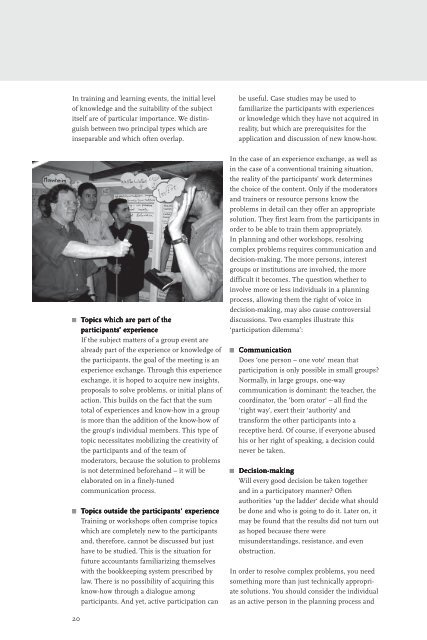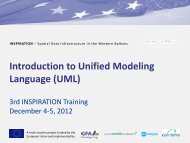MOVE - Moderation and Visualization for Group ... - INSPIRATION
MOVE - Moderation and Visualization for Group ... - INSPIRATION
MOVE - Moderation and Visualization for Group ... - INSPIRATION
You also want an ePaper? Increase the reach of your titles
YUMPU automatically turns print PDFs into web optimized ePapers that Google loves.
In training <strong>and</strong> learning events, the initial level<br />
of knowledge <strong>and</strong> the suitability of the subject<br />
itself are of particular importance. We distinguish<br />
between two principal types which are<br />
inseparable <strong>and</strong> which often overlap.<br />
■ Topics opics which which are are are part part of of of the<br />
the<br />
participants<br />
participants’ participants<br />
participants ’ experience<br />
experience<br />
If the subject matters of a group event are<br />
already part of the experience or knowledge of<br />
the participants, the goal of the meeting is an<br />
experience exchange. Through this experience<br />
exchange, it is hoped to acquire new insights,<br />
proposals to solve problems, or initial plans of<br />
action. This builds on the fact that the sum<br />
total of experiences <strong>and</strong> know-how in a group<br />
is more than the addition of the know-how of<br />
the group’s individual members. This type of<br />
topic necessitates mobilizing the creativity of<br />
the participants <strong>and</strong> of the team of<br />
moderators, because the solution to problems<br />
is not determined be<strong>for</strong>eh<strong>and</strong> – it will be<br />
elaborated on in a finely-tuned<br />
communication process.<br />
■ Topics opics outside outside the the participants‘ participants‘ participants‘ experience<br />
experience<br />
Training or workshops often comprise topics<br />
which are completely new to the participants<br />
<strong>and</strong>, there<strong>for</strong>e, cannot be discussed but just<br />
have to be studied. This is the situation <strong>for</strong><br />
future accountants familiarizing themselves<br />
with the bookkeeping system prescribed by<br />
law. There is no possibility of acquiring this<br />
know-how through a dialogue among<br />
participants. And yet, active participation can<br />
20<br />
be useful. Case studies may be used to<br />
familiarize the participants with experiences<br />
or knowledge which they have not acquired in<br />
reality, but which are prerequisites <strong>for</strong> the<br />
application <strong>and</strong> discussion of new know-how.<br />
In the case of an experience exchange, as well as<br />
in the case of a conventional training situation,<br />
the reality of the participants’ work determines<br />
the choice of the content. Only if the moderators<br />
<strong>and</strong> trainers or resource persons know the<br />
problems in detail can they offer an appropriate<br />
solution. They first learn from the participants in<br />
order to be able to train them appropriately.<br />
In planning <strong>and</strong> other workshops, resolving<br />
complex problems requires communication <strong>and</strong><br />
decision-making. The more persons, interest<br />
groups or institutions are involved, the more<br />
difficult it becomes. The question whether to<br />
involve more or less individuals in a planning<br />
process, allowing them the right of voice in<br />
decision-making, may also cause controversial<br />
discussions. Two examples illustrate this<br />
‘participation dilemma’:<br />
■ Communication<br />
Communication<br />
Does ‘one person – one vote’ mean that<br />
participation is only possible in small groups?<br />
Normally, in large groups, one-way<br />
communication is dominant: the teacher, the<br />
coordinator, the ’born orator‘ – all find the<br />
‘right way’, exert their ‘authority’ <strong>and</strong><br />
trans<strong>for</strong>m the other participants into a<br />
receptive herd. Of course, if everyone abused<br />
his or her right of speaking, a decision could<br />
never be taken.<br />
■ Decision-making<br />
Decision-making<br />
Will every good decision be taken together<br />
<strong>and</strong> in a participatory manner? Often<br />
authorities ‘up the ladder‘ decide what should<br />
be done <strong>and</strong> who is going to do it. Later on, it<br />
may be found that the results did not turn out<br />
as hoped because there were<br />
misunderst<strong>and</strong>ings, resistance, <strong>and</strong> even<br />
obstruction.<br />
In order to resolve complex problems, you need<br />
something more than just technically appropriate<br />
solutions. You should consider the individual<br />
as an active person in the planning process <strong>and</strong>
















